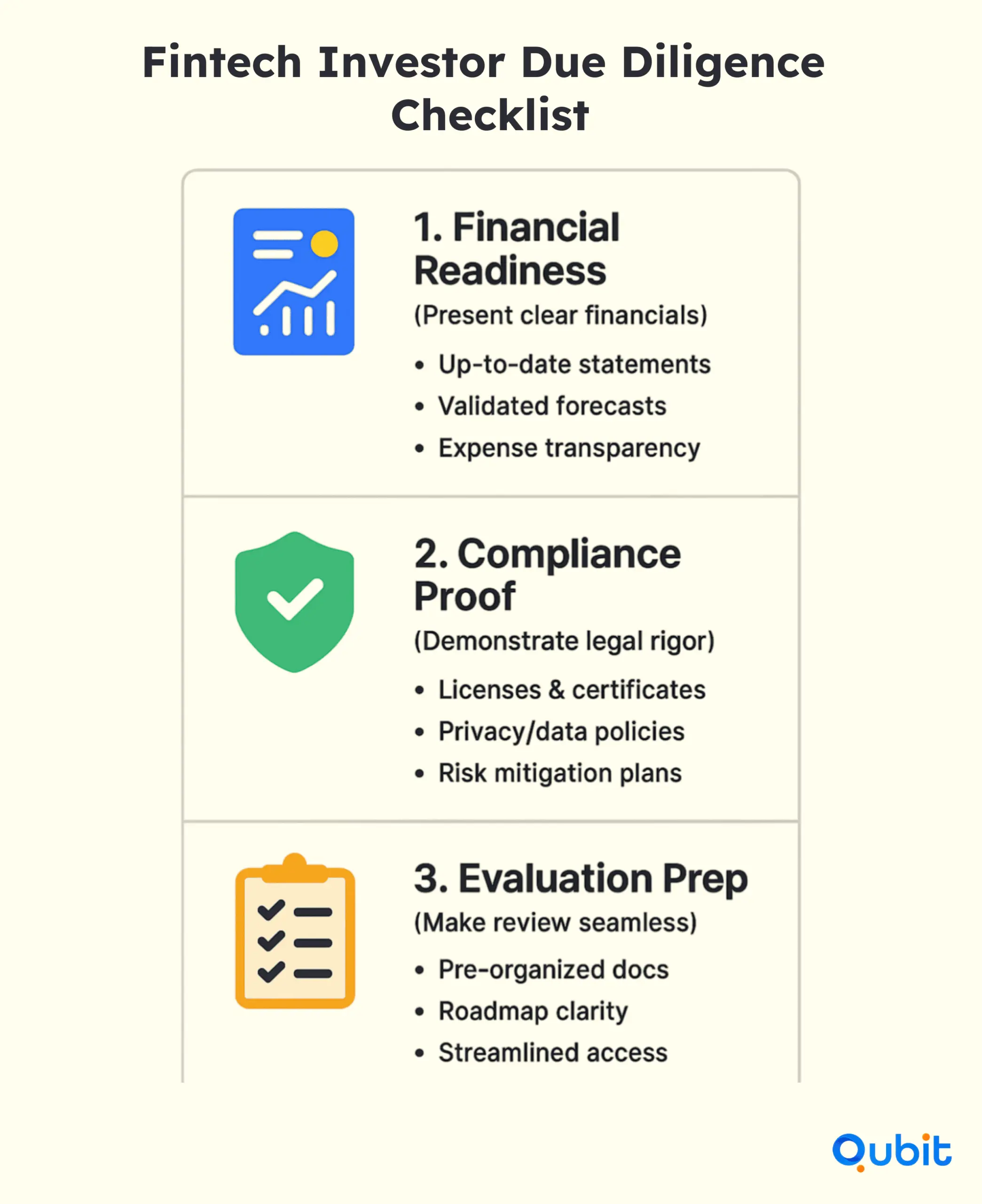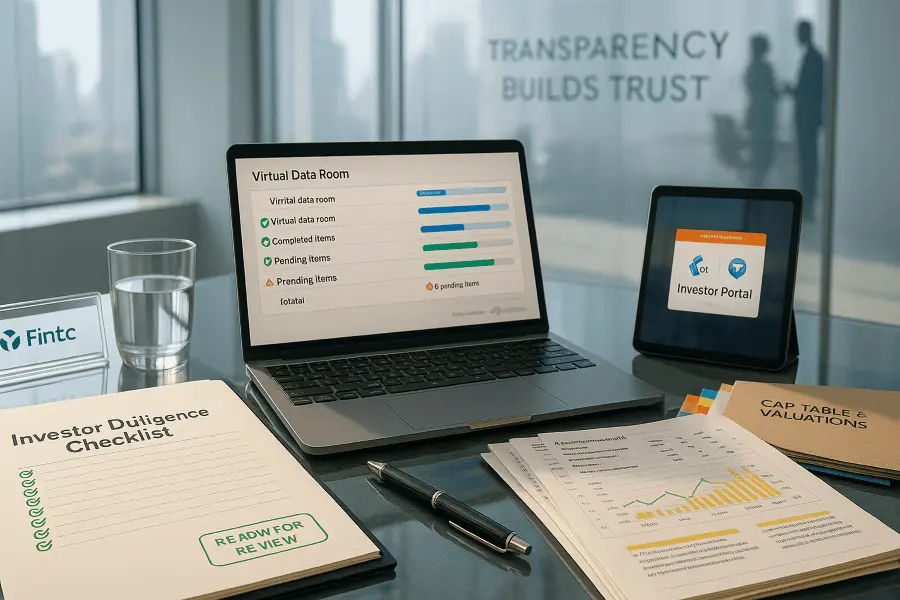FinTech fundraising readiness involves aligning your business model, financial projections, and compliance standards to meet investor expectations. Equally important is mastering investor due diligence, a process where investors scrutinize every aspect of your business to assess its viability and potential risks.
A high-level perspective in fintech fundraising strategies and opportunities offers an expansive view of market trends and funding approaches that complements the detailed themes explored throughout the pillar.
This blog will guide you through actionable strategies to achieve readiness, overcome regulatory challenges, and excel in investor evaluations.
Let’s dive into the essentials that can set your FinTech venture apart.
Understanding the FinTech Funding Landscape
The FinTech funding landscape is marked by its diversity and rapid evolution, requiring businesses to adopt tailored approaches to secure investment. Investors in this space range from venture capitalists and angel investors to corporate funds and private equity firms, each bringing unique priorities and expectations to the table.
Engaging effectively with these varied investor profiles demands a customized strategy. For instance, venture capitalists often prioritize scalability and disruptive innovation, while corporate funds may focus on strategic alignment with their existing operations. Recognizing these distinctions allows FinTech companies to craft pitches that resonate with specific investor goals.
Why Should Fintech Startup Prioritize Compliance and Regulations?
The FinTech industry’s explosive growth has brought both opportunities and challenges. As startups and established players innovate, they face increasingly stringent regulatory requirements, including Anti-Money Laundering (AML) protocols, Know Your Customer (KYC) standards, and complex cross-border compliance. These regulations, while essential for maintaining financial integrity, can create hurdles for companies seeking funding.
Investor confidence often hinges on a company’s ability to demonstrate robust compliance strategies. Without proactive measures to address regulatory complexities, fundraising efforts may falter during due diligence processes. Transparent communication about compliance frameworks not only reassures investors but also sets the foundation for long-term trust.
To thrive in this competitive landscape, FinTech companies must prioritize compliance as a core component of their operations. By doing so, they can mitigate risks, streamline funding efforts, and position themselves as reliable partners in the eyes of investors.
Fintech Investor Due Diligence Checklist
Investor due diligence is a critical phase where potential backers evaluate your business’s financial health, compliance, and scalability. By addressing these areas proactively, you can minimize friction and ensure a smoother evaluation process.

1. Organize Financial Statements and Forecasts
Investors rely heavily on accurate financial documentation to assess the viability of your business. This includes:
- Historical financial statements: Ensure these are up-to-date and audited, if possible, to establish credibility.
- Revenue forecasts: Provide realistic projections backed by market research and data.
- Expense breakdowns: Detail operational costs to demonstrate fiscal responsibility.
When financial records are well-organized, investors can quickly grasp your business’s potential, reducing delays in decision-making.
2. Prioritize Compliance Documentation
Compliance is non-negotiable, especially in regulated industries like fintech. Investors need assurance that your business adheres to legal and regulatory standards. Essential compliance documents include:
- Licensing and certifications: Verify that all required permits are valid and accessible.
- Data protection policies: Highlight your adherence to privacy laws such as GDPR or CCPA.
- Risk management protocols: Showcase strategies for mitigating operational and financial risks.
3. Streamline Investor Evaluation
Preparation is key to overcoming potential funding roadblocks. A comprehensive outline in the fintech due diligence checklist provides a clear breakdown of preparatory steps that integrate well with the overall evaluation of fundraising readiness. By following such checklists, founders can ensure their documentation aligns with investor expectations, saving time and avoiding unnecessary complications.
Optimizing Transaction Structure in Fintech for Regulatory Capital
Structuring FinTech transactions demands a meticulous approach to ensure compliance with regulatory capital requirements while maintaining investor confidence. The choice of financial instruments and deal terms plays a pivotal role in achieving these objectives.
Understanding Regulatory Capital Thresholds
Regulatory capital serves as a safeguard for financial institutions, ensuring they can absorb losses and maintain stability. A well-structured transaction is essential to meet these thresholds, particularly for FinTech firms operating in highly regulated environments. Instruments such as preference shares and convertible notes must be carefully evaluated, as not all qualify toward Common Equity Tier 1 (CET1) capital.
Selecting Financial Instruments
The selection of financial instruments can significantly impact capital adequacy. For instance:
- Preference Shares: While they offer flexibility in structuring deals, they may not always count toward CET1 capital, depending on their terms.
- Convertible Notes: These instruments can provide short-term funding but must be structured to align with regulatory requirements to avoid adverse effects on capital ratios.
Deal Terms and Their Implications
Beyond the choice of instruments, specific deal terms can influence regulatory capital calculations. Indemnity clauses, for example, may introduce contingent liabilities that reduce capital adequacy. Similarly, terms that prioritize investor payouts over institutional stability can erode confidence and regulatory compliance.
Balancing Compliance and Investor Confidence
Achieving the right balance between regulatory compliance and investor expectations requires strategic planning. Structuring transactions to meet capital adequacy standards while offering attractive terms to investors is key to long-term success.
How to Streamline Ownership Control Procedures For Fundraising Readiness
Ownership control procedures play a pivotal role in ensuring compliance and reducing risks for investors. These procedures typically begin at a 10% stake, with additional thresholds that require regulatory scrutiny. Understanding these benchmarks is essential for structuring ownership frameworks that align with legal requirements and facilitate smoother approval processes.
Regulatory Thresholds and Control Assessments
Acquiring qualifying holdings often triggers specific regulatory thresholds, starting at 10% ownership. Beyond this, incremental stakes—such as 20%, 30%, or 50%—may demand further control assessments to evaluate the impact on governance and operational dynamics. Proper structuring of ownership frameworks not only simplifies these assessments but also minimizes delays in obtaining regulatory approvals.
Empirical observations in fintech valuation benchmarks clarify how valuation metrics evolve across funding stages, offering a contextual frame that enhances your understanding of fundraising dynamics.
Structuring for Regulatory Approvals
A well-structured ownership framework is critical for meeting regulatory requirements efficiently. By anticipating potential challenges and aligning ownership stakes with compliance standards, businesses can mitigate risks and avoid unnecessary complications. This approach also fosters investor confidence, as it demonstrates a proactive commitment to transparency and governance.
Cross-Border Complexities
Cross-border transactions introduce additional layers of complexity to ownership control procedures. Variations in regulatory standards across jurisdictions require meticulous planning and coordination. Factors such as differing definitions of qualifying holdings, approval timelines, and local compliance norms must be carefully managed to ensure seamless execution. Addressing these complexities upfront can prevent costly delays and safeguard the integrity of the transaction.
Streamlining ownership control procedures is not just about meeting regulatory thresholds—it’s about creating a robust framework that supports growth while minimizing risks.
Regulatory Shifts in Fintech Sector
Regulatory shifts are reshaping the financial industry, introducing new challenges for market participants. One notable development is the ongoing debate surrounding potential bans on payment for order flow (PFOF). This practice, where brokers receive compensation for directing trades to specific market makers, has sparked concerns about transparency and fairness. If implemented, such bans could significantly alter the operational dynamics for brokers and investors alike.
Emerging regulatory debates, like the possible prohibition of PFOF, add layers of complexity to the fundraising landscape. These changes may influence how firms approach capital acquisition and compliance strategies, requiring them to adapt to evolving standards. For businesses reliant on traditional brokerage models, the implications could be profound, prompting a reevaluation of existing processes.
How FinTech Fundraising Works: Proven Results
FinTech sector requires precision, strategy, and a proven process. With over $3 billion in funding successfully secured, the results speak for themselves. This achievement highlights the effectiveness of structured fundraising strategies tailored to the unique needs of FinTech companies.
A streamlined fundraising process is essential for delivering such impressive outcomes. From identifying potential investors to crafting compelling pitches, every step is meticulously planned to maximize success. These strategies not only ensure efficiency but also build trust with stakeholders, paving the way for long-term partnerships.
The $3 billion milestone serves as a testament to the expertise in advising clients on fundraising efforts. It demonstrates how a well-executed process can transform ambitious goals into tangible results. By focusing on strategic planning and execution, FinTech companies can unlock their potential and secure the resources needed to thrive in a competitive market.
Our Expertise in FinTech Advisory
Success in FinTech demands more than innovation, it requires strategic expertise. At Qubit Capital, we specialize in FinTech advisory, offering tailored fundraising strategies that align with industry trends and investor expectations. Our deep understanding of the sector enables us to craft actionable plans that drive results, whether you're seeking seed funding or scaling for growth.
Investors trust us because we address complex regulatory and compliance challenges with precision. Our team’s experience ensures that your business is not only prepared for due diligence but also positioned to instill confidence in stakeholders.
Crafting a Compelling Investor Narrative for Your Fintech Startup
A well-crafted investor narrative can transform a pitch into a powerful story that captivates potential investors. By presenting your startup’s vision and value proposition in a clear and engaging manner, you create a lasting impression that sets your business apart from competitors.
The key to a compelling narrative lies in its ability to communicate your startup’s mission, the problem it solves, and the unique approach it takes to address market needs. Investors are not just looking for numbers; they want to connect with the story behind your business. Highlighting your vision and business model with clarity ensures that your pitch resonates on both an emotional and strategic level.
Nuanced insights in fintech pitch deck essentials reveal the fundamental elements that shape a compelling presentation, which aligns naturally with the broader fundraising strategies discussed.
By differentiating your pitch through storytelling, you can inspire confidence and foster meaningful connections with those who can help propel your startup forward.
Staying Resilient and Adaptive in FinTech
Thriving in the fast-paced FinTech industry requires a combination of resilience and adaptability. As regulatory frameworks and market dynamics shift rapidly, businesses must stay agile to maintain their competitive edge. Resilience, in this context, is not just about enduring challenges but about pivoting effectively when conditions demand it.
Adapting to regulatory changes is a cornerstone of success. FinTech startups that proactively align with evolving compliance requirements can avoid disruptions and build trust with stakeholders. Similarly, staying attuned to market trends ensures that businesses can anticipate customer needs and innovate accordingly. For instance, adaptation helps sustain growth during uncertain market conditions, enabling companies to remain relevant even when external factors fluctuate.
Resilient startups often distinguish themselves by their ability to turn challenges into opportunities. Whether it’s embracing new technologies or rethinking business models, the ability to pivot quickly is what sets them apart. In a sector defined by constant evolution, adaptability isn’t optional, it’s essential for long-term growth.
Conclusion
Preparing for successful fundraising requires a combination of strategic planning and attention to detail. From ensuring regulatory compliance to establishing robust transaction structures and maintaining clear ownership control, every step plays a vital role in building investor confidence. A well-crafted pitch narrative, tailored to highlight your startup’s unique value, can make all the difference in standing out during due diligence.
By focusing on these actionable strategies, you can position your business for long-term success and secure the capital needed to grow. If you’re looking to raise with clean compliance and a crisp story, at Qubit we understand KYC/AML, transaction structuring, and cap table control. De-risk diligence with our fintech fundraising assistance and schedule a fast readiness review.
Key Takeaways
- Thorough due diligence is crucial for successful fundraising.
- Regulatory compliance and optimized transaction structures build investor confidence.
- Effective ownership control procedures minimize cross-border risks.
- A robust business model and compelling narrative are essential for engaging investors.
Frequently asked Questions
What is fintech fundraising readiness?
Fintech fundraising readiness refers to how well a startup is prepared to meet regulatory requirements, structure transactions efficiently, and provide comprehensive investor due diligence. This readiness ensures the startup can confidently approach investors with a solid foundation.






